On this day in 1876, Colorado is admitted to the Union as the 38th state. America was then celebrating its 100th birthday, which is why Colorado is known as the Centennial state.
Did you know that Colorado chose not to conduct a presidential election in 1876?
The new state was looking at a tight timeline. It was admitted into the Union only three months before the presidential election. It would have been logistically difficult and fairly expensive to hold a statewide popular vote that year.
So the state simply didn’t do it. The legislature directly appointed electors instead.

The move sounds surprising to modern ears, but early Americans knew something that today’s voters have forgotten: Our unique presidential election system gives states flexibility to look out for the best interests of their own citizens. No national, centralized force drives presidential elections: States are in charge.
Importantly, this power resides in the hands of state legislatures, not their Governors. “Each State shall appoint,” the Constitution provides, “in such Manner as the Legislature thereof may direct, a Number of Electors . . . .”
Historically, state legislatures have taken this responsibility seriously, and they’ve acted independently in ways that are largely unexpected today.
Consider what happened in Wyoming, which became a state in 1890. Two years later, that state hosted a presidential election in which women were allowed to vote. Wyoming didn’t lobby other states, asking for permission. It simply acted in accordance with Wyoming’s needs and preferences.
The state had a pragmatic—and perhaps humorous—reason for its decision. It needed to attract more women to the frontier!
Other states have displayed their independence in other ways.
Massachusetts once had a system in which the state legislature would select electors if no one received a majority of the state’s popular vote. Meanwhile, Maine and Nebraska currently reject the winner-take-all allocation of electors used by the rest of the country. Instead, those two states allocate their electors by congressional district.
In 1836, Virginia refused to accept the Democratic nominee for Vice President. Richard M. Johnson of Kentucky was controversial because he’d been living with one of his slaves. Virginians were horrified and chose electors pledged to William Smith of Alabama instead.
In 1892, some states did not include Grover Cleveland on their ballots. In 1948, some states rejected Harry S. Truman. In 1860, ten southern states refused to list Abraham Lincoln.
At least reportedly, some states gave Teddy Roosevelt’s electors freedom to vote as they thought best in a three-man race in 1912. If Roosevelt was undermining William Taft’s chances of defeating Woodrow Wilson, then they were supposed to vote for Taft instead.
Obviously, state independence doesn’t suggest that states will always act with perfect motives. “If men were angels,” James Madison famously wrote, “no government would be necessary.” However, the decentralized system reflects perhaps the most fundamental cornerstone of our Constitution: checks and balances. Such safeguards ensure that a variety of voices are heard.
In recent years, we’ve strayed from the Founders’ decentralized, state-by-state approach to presidential elections. Instead, national media, national polling agencies, and the national political parties dictate much of what happens.
We are straying from the Founders’ design and simultaneously becoming more angry and divided. Perhaps that’s no coincidence.
Please check out Tara's book, Why We Need the Electoral College, for more.
Comentários